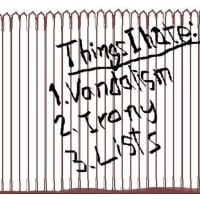12月3日のArcaMax Vocabulary(メルマガ)の記事も興味のある内容でした。
読書(ネイティブ)から代名詞のおかしな使用法をよく見掛けるとの投書がありました。
Q: What's your opinion of the commonplace use of "they" to mean "he or she," "them" to mean "him or her," and "their" to mean "his or her?" Here is an example of part of a note that might be sent home by my child's school: "If your child wishes to purchase a lunch, they should bring their money in an envelope."
回答は丁寧ですが、全てを引用すると長いので抜粋して以下に紹介します。
Technically, of course, the singular antecedent "child" requires a singular pronoun. The old-fashioned solution was to use the masculine pronouns "he," "him" and "his" to refer to both genders, i.e., "He should bring his money in an envelope."
Another option is to use double-barreled pronouns, e.g., "he or she," "him or her," "he/she" and "him/her." But such constructions are cumbersome and awkward and, when used more than a few times, become tedious and annoying to readers or listeners.
回答者の結論です。
* Use a plural subject with "they": If your children want to purchase a lunch, they ...
* Rewrite the sentence to eliminate pronouns entirely: Your child can purchase a lunch by bringing money in an envelope.
* Change the pronoun to an article, such as "the" or "a": A child wishing to purchase lunch should bring the money in an envelope.
納得です。 英文を書くことはほとんどありませんが、ネイティブでも手本にならない英語を使う事があるので要注意という例でした。
読書(ネイティブ)から代名詞のおかしな使用法をよく見掛けるとの投書がありました。
Q: What's your opinion of the commonplace use of "they" to mean "he or she," "them" to mean "him or her," and "their" to mean "his or her?" Here is an example of part of a note that might be sent home by my child's school: "If your child wishes to purchase a lunch, they should bring their money in an envelope."
回答は丁寧ですが、全てを引用すると長いので抜粋して以下に紹介します。
Technically, of course, the singular antecedent "child" requires a singular pronoun. The old-fashioned solution was to use the masculine pronouns "he," "him" and "his" to refer to both genders, i.e., "He should bring his money in an envelope."
Another option is to use double-barreled pronouns, e.g., "he or she," "him or her," "he/she" and "him/her." But such constructions are cumbersome and awkward and, when used more than a few times, become tedious and annoying to readers or listeners.
回答者の結論です。
* Use a plural subject with "they": If your children want to purchase a lunch, they ...
* Rewrite the sentence to eliminate pronouns entirely: Your child can purchase a lunch by bringing money in an envelope.
* Change the pronoun to an article, such as "the" or "a": A child wishing to purchase lunch should bring the money in an envelope.
納得です。 英文を書くことはほとんどありませんが、ネイティブでも手本にならない英語を使う事があるので要注意という例でした。



























※コメント投稿者のブログIDはブログ作成者のみに通知されます